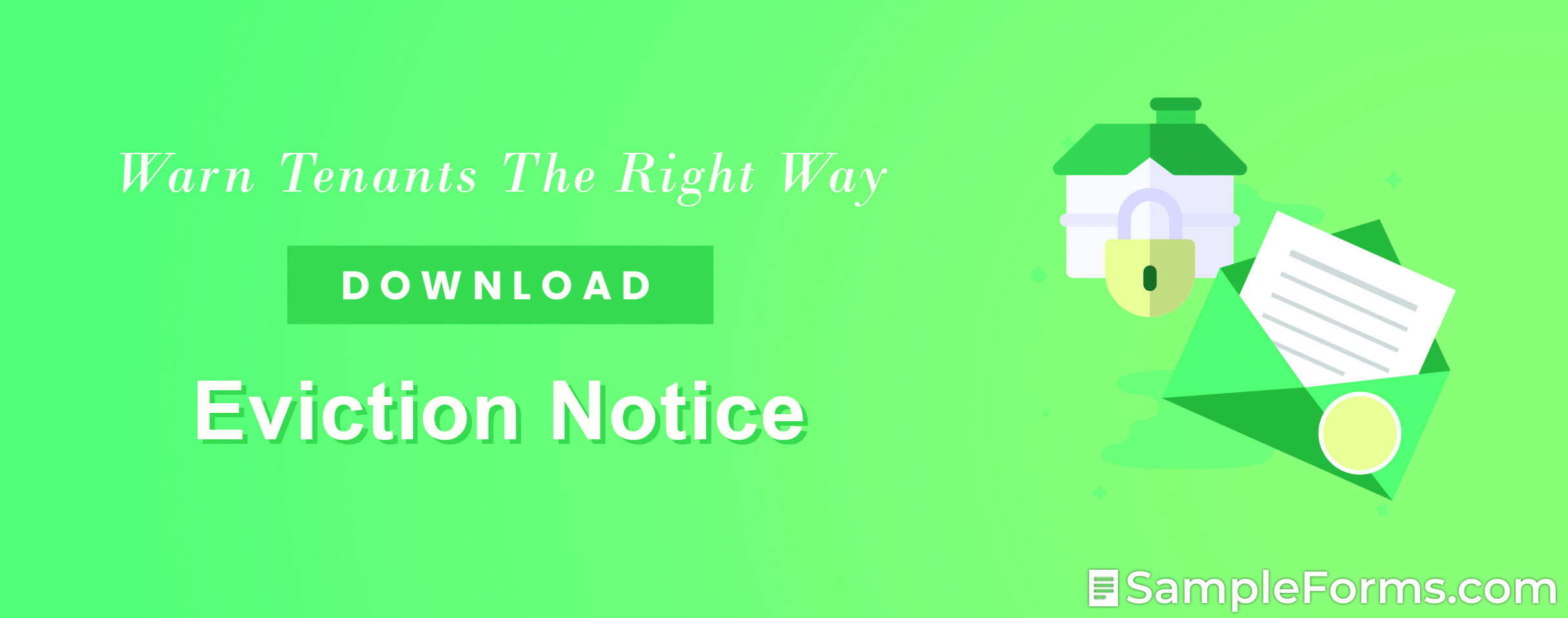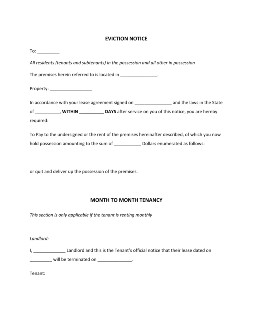- Eviction Notice Forms
- Power of Attorney Forms Forms
- Bill of Sale (Purchase Agreement) Forms
- Lease Agreement Forms
- Rental Application Forms
- Living Will Forms Forms
- Recommendation Letters Forms
- Resignation Letters Forms
- Release of Liability Agreement Forms
- Promissory Note Forms
- LLC Operating Agreement Forms
- Deed of Sale Forms
- Consent Form Forms
- Support Affidavit Forms
- Paternity Affidavit Forms
- Marital Affidavit Forms
- Financial Affidavit Forms
- Residential Affidavit Forms
- Affidavit of Identity Forms
- Affidavit of Title Forms
- Employment Affidavit Forms
- Affidavit of Loss Forms
- Gift Affidavit Forms
- Small Estate Affidavit Forms
- Service Affidavit Forms
- Heirship Affidavit Forms
- Survivorship Affidavit Forms
- Desistance Affidavit Forms
- Discrepancy Affidavit Forms
- Career Assessment - 16+ Examples, Format, Tips, Pdf Forms
- Undertaking Affidavit Forms
- General Affidavit Forms
- Affidavit of Death Forms
Eviction Notice
An Eviction Notice Template is a common form between a landlord and a tenant in a rental to inform in advance that a renter should leave the property soon. This notice form serves as a warning for tenants about the possibility of moving to another apartment or residential property. Eviction processes must then follow legal standards where there is an acceptable reason for removing the renter. Then the notice should be sent early, specifically in a 30-day period. However, it can go from 20-60 days as well, depending on the circumstances. Read More

Eviction Notice
- What Is an Eviction Notice?
- Where Does an Eviction Notice Apply to?
- How to Create an Acceptable Eviction Notice
- Frequently Asked Questions
- How Many Days Are Given to Move Out after Receiving an Eviction Notice?
- Are Handwritten Eviction Notices Acceptable?
- Can I Stop the Eviction?
- Is Eviction Legal without Stating the Reason?
An Eviction Notice Template is a common form between a landlord and a tenant in a rental to inform in advance that a renter should leave the property soon. This notice form serves as a warning for tenants about the possibility of moving to another apartment or residential property. Eviction processes must then follow legal standards where there is an acceptable reason for removing the renter. Then the notice should be sent early, specifically in a 30-day period. However, it can go from 20-60 days as well, depending on the circumstances.
What Is an Eviction Notice?
An Eviction Notice refers to the official document made by the landlord to put an end on the rental contract of a tenant. The tenants may have gotten removed due to consistent nonpayment, failure to comply with the agreement, and other reasonable factors. Once a tenant receives such a form, then he or she should comply with its terms or discuss these terms of another consideration with the landlord. According to Investopedia, the state law is responsible for governing the overall eviction. If finalized, then tenants have no choice but to prepare to vacate the property.
Common terms closely related to an eviction notice consist of the following:
- Notice of Eviction
- Notice to Quit
- Notice to Vacate
- Eviction Letter
Where Does an Eviction Notice Apply to?
Eviction notices inform tenants of the need to vacate before it leads to the court process whenever they do not follow the instructions to leave. These documents apply to renters in an apartment, condominium, or residential home. Landlords own such properties anyway, and are, therefore, expected to have rules introduced ahead of the rental, including eviction terms. Besides renting a property as a temporary home, some tenants rent for business too. That is why, in a mall or commercial property, the manager has a right to evict tenants who fail to pay for their rent and other concerns.
How to Create an Acceptable Eviction Notice
1. Draft the Message
It is common to have possible mistakes upon making an eviction notice for the first time, but you can minimize this through drafting. Start by making a conversational type of message in sending the letter until it gets edited into a professional or formal version. That way, it will serve as an official document afterward. Then, list down what needs to be said as well, before finalizing it.
2. Transfer the Essential Points on the Document
Transferring the listed details to the final document comes next. Be sure to omit the unnecessary and faulty information because only the relevant and vital factors must be found on the sheet. The complete information should observe proper arrangements accordingly for the benefit of both parties.
3. Observe Easy Presentation
Effective communication can happen by adapting ways that ensure convenience for both sides. Check the presentation of the terms. Make sure that points are clear and are easily understood. There may be a need to add instructions and explanations in some parts. And dividing details into categories can make it easy as well, so all information would not be stuck in one paragraph.
4. Provide Evidence
Tenants might automatically require proof about the reasons stated that they label those as claims only. To avoid further complaints, proving why the tenant deserves eviction is necessary. If the reason involves nonpayment, then the landlord should attach the documents showing that the tenant failed to pay the dues. For damaged properties, attaching a photo of the damage can help clarify it. The point here is to ensure that everything is proven.
5. Help Provide a Solution
Landlords need to choose how they word their eviction terms. Helping out the tenants will be better as with providing an alternative plan by paying a certain amount as soon as possible, and the eviction may cease. When renters get scared at not knowing where to transfer, then giving them options of potential properties to rent is useful.
6. Conduct an Evaluation
Evaluate if the entire details observe that it is considered an effective eviction notice. Evaluations even help identify errors until anything wrong receives corrections. Common essential factors to check are the eviction schedule, signatures, applicable fees, and so much more. Submit the document only when one feels confident that the information is confirmed.
Frequently Asked Questions
How Many Days Are Given to Move Out after Receiving an Eviction Notice?
The days given for tenants in preparing to leave can vary as it is possible to have a 7-day period given or perhaps 20, 30, 60, and 90 days. Those who committed severe offenses may turn expected to leave sooner than those with less serious offenses. No matter what the number of days given is, that should be counted ahead to prepare.
Are Handwritten Eviction Notices Acceptable?
Yes, it is acceptable. A typed or printed eviction notice is not considered an official requirement since notices can be handwritten. However, the letter must at least follow the standards for it to become considered a formal notice and for tenants to respect it.
Can I Stop the Eviction?
Stopping landlords in sending the eviction notices to tenants may be hard, but there are other ways to prevent the process of continuing. An example is to come up with an official complaint addressed to the right authority. Maybe the details stated in the notice are not a hundred percent accurate, so the tenant has a right to rebut it.
Is Eviction Legal without Stating the Reason?
There is always a reason behind evictions, but sometimes landlords do not state it. Some areas even consider it legal to evict without reasoning, but the given days should be long enough for tenants to move out instead of immediate eviction. 30-60 days will be an acceptable limit of days for this matter.
Everything should start with a warning before making huge decisions. This is why eviction notices keep tenants informed ahead because there will be arguments and complaints that follow up when landlords suddenly force renters to get out of the property without prior notice. As with any other form of agreement, everything should be written down and signed between renters and landowners before the beginning of the rental. There should also be an agreement at the end of the rent which is what happens in an eviction.

